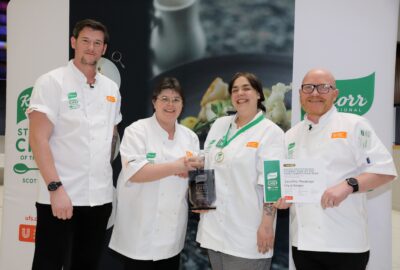Putting the care into catering
Care caterers face very different challenges to other sectors of the industry. As Neel Radia, national chair, National Association of Care Catering (NACC), explains: “The complex dietary and dining needs of elderly people can make them more susceptible to malnutrition and dehydration and related illnesses. Food intolerances, reduced appetites, dysphagia and dementia, for example, can prove a real obstacle in ensuring they receive the nutrients and liquid intake they require.
“Care providers therefore have an absolute responsibility to effectively recognise and respond to individual needs, through screening and monitoring residents and implementing comprehensive catering practices, to ensure that good nutrition and hydration is a fundamental part of quality care provision.”
Aine Melichar, brand manager for Kerrymaid, recommends making positive changes to improve residents’ quality of life. “From arranging regular tea and coffee mornings to encourage hydration to hosting regular cooking sessions focusing on nutritional benefits of a meal and avoid malnutrition, there are many ways that care home caterers can go above and beyond to ensure the wellbeing of their residents.”
Fast facts There are an estimated 426,000 elderly and disabled people in residential care in the UK There are 11.6million over 65s in the UK (17.8% of the population) The cost of malnutrition is also staggering and accounts for nearly £20billion of health and social care spending in England (BAPEN, 2015) According to NHS England, 60-75% of care home residents may experience difficulty or discomfort with swallowing (dysphagia) It is estimated that up to 27% of residents in UK care homes have diabetes According to the Alzheimer’s Society, there are round 850,000 people in the UK who have dementia, which is predicted to rise to 1 million people by 2025. Two thirds live in the community whilst the other third are in care homes.
Vital vitamins Many over 65s run the risk of vitamin D deficiency over the winter months – an issue the medical profession is describing as the silent epidemic of the elderly. Vitamin D deficiency can mean serious repercussions for the elderly, including osteomalacia which can cause bone pain and tenderness. Studies have also shown it contributes to heart disease, bowel and breast cancer, as well as type 2 diabetes and multiple sclerosis.
To help caterers take care of their residents, Pritchitts has released a recipe booklet containing 12 delicious dishes using Millac Gold Double with added vitamin D, to help them give menus a sunshine boost. Caterers can claim their free recipe booklet and free sample by visiting http://www. pritchitts.com/care-home-fortificationsample- offer.
Dysphagia Dysphagia is prevalent in care homes across the UK and it is a growing problem, according to the National Association of Care Catering (NACC). People with dysphagia are at greater risk of malnutrition, dehydration, aspiration pneumonia and choking. Chefs need to think carefully and nutritionally about the ingredients and methods used in texture modification. For example, when thinning food it is not just about adding a liquid. It’s about adding a liquid that contains nutrients and much-needed calories, such as a stock or cream. Well-thought out presentation of texture-modified food is also important in order to protect a resident’s dignity and boost their appetite. Reforming, piping and moulding food to look like the original dish will increase its appeal and naturally encourage eating. Premier Foods has produced a Care Catering Solutions Guide packed with recipe ideas and practical tips to help create nutritious and appetising meals, which ensure dignity in dining for residents. It can be downloaded at www.premierfoodservice.co.uk.
Overcoming dehydration Inadequate nutrition and hydration can have serious effects, as many functions that are fundamental in protecting and conserving the body rely on sufficient water intake. Offering regular cups of tea is a good solution, says Isabelle Haynes, for Tetley. “It is a common myth that caffeinated beverages dehydrate the body due to their diuretic properties. In fact caffeine doesn’t affect hydration and a refreshing cup of tea can effectively help to hydrate the body.” A mid-afternoon cup of tea deserves an accompanying sweet treat too. Ben Bartlett, celebrity chef, advises: “Make a daily occasion of British bakes and serve up a slice of old-fashioned home comfort, with indulgent chocolate and coconut marble cake, or light lemon drizzle cake. A goodquality butter alternative, like Whirl, gives the traditional buttery taste people love but with all the convenience and cost savings of a vegetable oil – not to mention lower saturated fat. A handful of fresh berries or sliced fruit on the side of the plate will add nutritional value.”
Top Tips Matt Dodge, 2015 Care Cook of the Year finalist, and head chef at Coombe Hill Manor in Kingston, has teamed up with Kerrymaid to provide these top hydration and nutrition tips:
- Bake a selection of cakes and scones and serve with a big pot of tea to encourage hydration – you’ll be surprised how much tea people can drink when sweet treats are involved!
- Place water points around the care home – offer a selection of juices, flavoured water and hot drinks
- Host monthly food meetings with residents, it’s a great chance to discuss what they’d like to see on the menu in the coming weeks
- Use Soil Association approved Food for Life products such as Kerrymaid to create healthy, tasty and sustainable meals for residents It’s important to note that many residents have previously lived by themselves before moving to a care home and have stopped preparing an evening meal. Often they’re not used to eating in the evening so it’s key that chefs include a variety of light and nutritionally balanced options on the evening menu to encourage uptake
Fortification The demand for fortified diets to support the health needs of the elderly is increasing. For people who are malnourished or at risk of malnutrition a fortified diet plays a vital role in helping to maintain weight and overall health. Food fortification is an effective and simple way of providing a few extra calories and nutrients in every mouthful through the use of ingredients such as milk, cream, butter, oils and nuts. Diabetic patients Care chefs should healthy meal options and individualised care plans to promote and maintain good weight control for diabetics. Key nutritional advice for people with diabetes: Saturated fats should be limited and replaced by unsaturated fats, mostly monounsaturated fats such as oily fish (salmon, sardines), nuts and seeds Daily consumption of foods fortified with plant sterols or stanols significantly improve cholesterol for people with diabetes, irrespective of statin (drug) treatment A Mediterranean style diet lowers blood pressure and improves ‘good’ cholesterol In overweight individuals, a modest amount of maintained weight loss (4.5kg or more) results in improvements in blood pressure Consumption of oily fish, rich in n-3 unsaturated fats, is recommended at least twice a week.
The NACC’s Fortified Meals Recipe Book gives caterers the know-how and capability to deliver this increasingly important element of care catering. Visit www.thenacc.co.uk to find out more.


